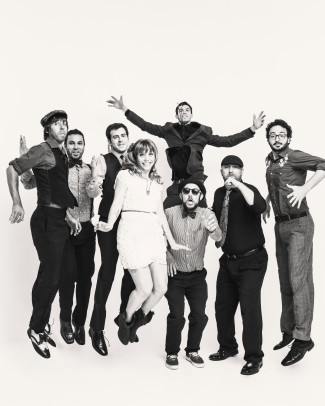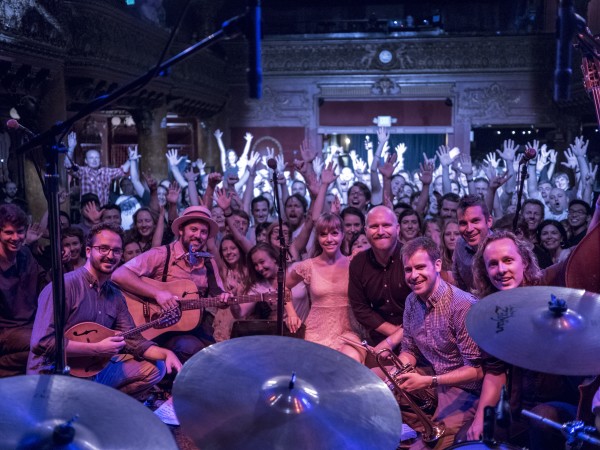INTERVIEW: Dustbowl Revival gear up for extensive tour, new live album

The Dustbowl Revival, based out of Venice, Calif., bills itself as a “spicy roots collective” with dashes of several American musical traditions. From bluegrass to gospel to swing, the members of the band put a new spin on an old sound.
Zach Lupetin, a native of Chicago, heads the collective, and he seems excited about the band’s plans for 2015.
“Well, we just finished recording what will be our first live album,” he said recently during a phone interview. “We wanted to start to share that with people … and part of the way we can do that is by touring more than ever before and going to places we’ve never been. And also in the spring, we’ll have this new live album to share with folks, so they can get a sense of what we really sound like.”
Lupetin arrived in Los Angeles by way of Chicago and the University of Michigan. When he landed in southern California, he instantly posted a craigslist advertisement asking for anyone who could play one of 20 instruments listed. He was also interested in musicians who liked New Orleans great Louis Armstrong, country legend Hank Williams and folk/blues expert Lead Belly.
He received enough responses to found The Dustbowl Revival.
“I didn’t realize what a fertile environment this would be,” he said. “Since the band started really playing shows in 2008, there’s been a definitely rising Americana resurgence, I would say, throughout California and really in the nation in general, but we’ve been sort of lucky to have the West Coast embrace it on a much bigger scale than we ever would have thought possible. We started as this idea of having a collective where we bring in new people all the time, and sometimes we have special guests. And any one of 15 different instruments will come in, whether it’s brass instruments or string instruments, and then probably about three years ago, when we started recording more extensively and touring more, we crystallized the lineup to around eight members, which is the trumpet, trombone, sometimes clarinet and sax, and then mandolin and fiddle, drums and upright bass, me on guitar singing, and a lady singer plays washboard. A girl, Liz, plays ukulele as well. It’s a big musical stew, I would say.”
Playing this style of roots music wasn’t always the musical taste for Lupetin. His father would blast blues music (they were in Chicago, after all), and Bob Dylan was a lyrical inspiration. But he also acted his age when growing up and listened to Green Day and Nirvana.
“I think I always knew that I wasn’t fully satisfied with that music. When I started playing in bands when I was about 14, I always had sort of a more blues and stripped-down sensibility that I wanted to bring some history into what I was doing and not just play what is the flavor of the moment, which is easy to do sometimes. So in college I started meeting people that were expanding my musical horizons even more – gospel music and bluegrass, which changed a lot for me.”

When he arrived in Los Angeles, besides recruiting The Dustbowl Revival’s members, he also took to songwriting. In fact, Lupetin said he sees himself more as a storyteller/songwriter than a guitarist/musician.
The audiences have responded in kind. Ever since debuting, The Dustbowl Revival has gained a sizable following and accolades in the Los Angeles press.
“People I think come to see us knowing that they’re going to get a really good time,” he said. “I think there’s an atmosphere created when you have a big band. It’s going to be a party. It’s going to be a celebration of sort of life and American music. It kind of can change depending on what shows we’re doing. We don’t really believe in set lists a lot of times, so we will read the crowd, read the venue and be like, all right, this is more of a full-time swing night, this is more of a barn dance/bluegrass/ho-down night. We’ll kind of flip in and out of different grooves depending on how we’re feeling, so people definitely come to see something different every time they come and see us, which is fun.”
There are inherent stresses with having such a large band. It’s difficult to certify every member as “making it,” but Dustbowl still takes to the road with the hopes of even more success. Their upcoming tour includes stops in New York, Washington, D.C., New Jersey, Pennsylvania, Massachusetts, Vermont and New Hampshire, among other states.
“I think I started seeing the momentum really rising when we started getting recognized as a special part of the L.A. music scene,” he said. “There’s a lot of people making great music in this town, and we started, I think, being something that people could really swear by that this is going to be something that you’ll never forget, and dance, and have a great time. And people started telling their friends, and I think we started feeling that we could expand our reach by going up to northern California. The San Francisco scene has really embraced us.”
Along those lines, the forthcoming live album will feature tunes recorded at the Troubadour in Los Angeles and the Great American Music Hall in San Francisco. “Probably about two years when we went on our first East Coast extensive tour, that’s when I think we started realizing that we could do this, and we could bring it to festivals and really make a spectacle on a bigger stage,” he said.
The Dustbowl Revival plays roughly 75 percent original tunes, and they also reinterpret classic songs. They brought a more rock ‘n’ roll feel to the timeless religious song “Down by the Riverside,” for example; the band’s live version usually includes a New Orleans-inspired second-line. Church music has never been so infectious.
“So you can kind of transform certain tunes into a new context, and we like to write our own songs that have an element of history to them,” he said. “Right now I’ve been listening to a lot of Johnny Cash hymns … and while I’m not overtly that religious, there’s something about the depth of feeling in those songs that you can tell inspired blues artists and rock ‘n’ roll artists like Led Zeppelin. It all sort of spills from the same source. I guess that’s why they call it roots music. It’s all from the same root.”
By John Soltes / Publisher / John@HollywoodSoapbox.com
-
Click here for more information on The Dustbowl Revival.

